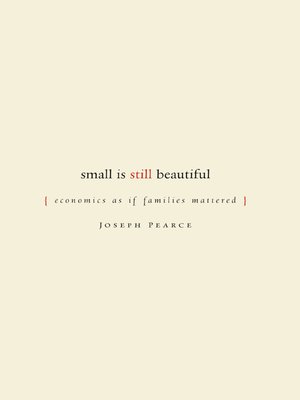
Sign up to save your library
With an OverDrive account, you can save your favorite libraries for at-a-glance information about availability. Find out more about OverDrive accounts.
Find this title in Libby, the library reading app by OverDrive.



Search for a digital library with this title
Title found at these libraries:
| Loading... |
A third of a century ago, E. F. Schumacher rang out a timely warning against the idolatry of giantism with his book Small Is Beautiful. Since then, millions of copies of Schumacher's work have been sold in dozens of different languages; few books before or since have spoken so profoundly to urgent economic and social considerations. Schumacher, a highly respected economist and adviser to third-world governments, broke ranks with the accepted wisdom of his peers to warn of impending calamity if rampant consumerism, technological dynamism, and economic expansionism were not checked by human and environmental considerations. Humanity was lurching blindly in the wrong direction, argued Schumacher. Its obsessive pursuit of wealth would not, as so many believed, ultimately lead to utopia but more probably to catastrophe.
Schumacher's greatest achievement was the fusion of ancient wisdom and modern economics in a language that encapsulated contemporary doubts and fears about the industrialized world. The wisdom of the ages, the perennial truths that have guided humanity throughout its history, serves as a constant reminder to each new generation of the limits to human ambition. But if this wisdom is a warning, it is also a battle cry. Schumacher saw that we needed to relearn the beauty of smallness, of human-scale technology and environments. It was no coincidence that his book was subtitled Economics as if People Mattered.
Joseph Pearce revisits Schumacher's arguments and examines the multifarious ways in which Schumacher's ideas themselves still matter. Faced though we are with fearful new technological possibilities and the continued centralization of power in large governmental and economic structures, there is still the possibility of pursuing a saner and more sustainable vision for humanity. Bigger is not always best, Pearce reminds us, and small is still beautiful.
Schumacher's greatest achievement was the fusion of ancient wisdom and modern economics in a language that encapsulated contemporary doubts and fears about the industrialized world. The wisdom of the ages, the perennial truths that have guided humanity throughout its history, serves as a constant reminder to each new generation of the limits to human ambition. But if this wisdom is a warning, it is also a battle cry. Schumacher saw that we needed to relearn the beauty of smallness, of human-scale technology and environments. It was no coincidence that his book was subtitled Economics as if People Mattered.
Joseph Pearce revisits Schumacher's arguments and examines the multifarious ways in which Schumacher's ideas themselves still matter. Faced though we are with fearful new technological possibilities and the continued centralization of power in large governmental and economic structures, there is still the possibility of pursuing a saner and more sustainable vision for humanity. Bigger is not always best, Pearce reminds us, and small is still beautiful.






